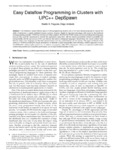Mostrar o rexistro simple do ítem
Easy Dataflow Programming in Clusters with UPC++ DepSpawn
| dc.contributor.author | Fraguela, Basilio B. | |
| dc.contributor.author | Andrade, Diego | |
| dc.date.accessioned | 2023-12-01T16:29:54Z | |
| dc.date.available | 2023-12-01T16:29:54Z | |
| dc.date.issued | 2019-06-01 | |
| dc.identifier.citation | B. B. Fraguela and D. Andrade, "Easy Dataflow Programming in Clusters with UPC++ DepSpawn," in IEEE Transactions on Parallel and Distributed Systems, vol. 30, no. 6, pp. 1267-1282, 1 June 2019, doi: 10.1109/TPDS.2018.2884716. | es_ES |
| dc.identifier.issn | 1045-9219 | |
| dc.identifier.issn | 1558-2183 | |
| dc.identifier.uri | http://hdl.handle.net/2183/34412 | |
| dc.description | Versión final aceptada de: https://doi.org/10.1109/TPDS.2018.2884716 | es_ES |
| dc.description | This version of the article has been accepted for publication, after peer review. Personal use of this material is permitted. Permission from IEEE must be obtained for all other uses, in any current or future media, including reprinting/republishing this material for advertising or promotional purposes, creating new collective works, for resale or redistribution to servers or lists, or reuse of any copyrighted component of this work in other works. The Version of Record is available online at: https://doi.org/10.1109/TPDS.2018.2884716 | es_ES |
| dc.description.abstract | [Abstract]: The Partitioned Global Address Space (PGAS) programming model is one of the most relevant proposals to improve the ability of developers to exploit distributed memory systems. However, despite its important advantages with respect to the traditional message-passing paradigm, PGAS has not been yet widely adopted. We think that PGAS libraries are more promising than languages because they avoid the requirement to (re)write the applications using them, with the implied uncertainties related to portability and interoperability with the vast amount of APIs and libraries that exist for widespread languages. Nevertheless, the need to embed these libraries within a host language can limit their expressiveness and very useful features can be missing. This paper contributes to the advance of PGAS by enabling the simple development of arbitrarily complex task-parallel codes following a dataflow approach on top of the PGAS UPC++ library, implemented in C++. In addition, our proposal, called UPC++ DepSpawn, relies on an optimized multithreaded runtime that provides very competitive performance, as our experimental evaluation shows. | es_ES |
| dc.description.sponsorship | This research was supported by the Ministerio de Economía, Industria y Competitividad of Spain and FEDER funds of the EU (TIN2016-75845-P), and by the Xunta de Galicia co-founded by the European Regional Development Fund (ERDF) under the Consolidation Programme of Competitive Reference Groups (ED431C 2017/04) as well as under the Centro Singular de Investigación de Galicia accreditation 2016-2019 (ED431G/01). We also acknowledge the Centro de Supercomputación de Galicia (CESGA) for the use of their computers. | es_ES |
| dc.description.sponsorship | Xunta de Galicia; ED431C 2017/04 | es_ES |
| dc.description.sponsorship | Xunta de Galicia; ED431G/01 | es_ES |
| dc.language.iso | eng | es_ES |
| dc.publisher | Institute of Electrical and Electronics Engineers | es_ES |
| dc.relation | info:eu-repo/grantAgreement/MINECO/Plan Estatal de Investigación Científica y Técnica y de Innovación 2013-2016/TIN2016-75845-P/ES/NUEVOS DESAFIOS EN COMPUTACION DE ALTAS PRESTACIONES: DESDE ARQUITECTURAS HASTA APLICACIONES (II)/ | es_ES |
| dc.relation.isversionof | https://doi.org/10.1109/TPDS.2018.2884716 | |
| dc.relation.uri | https://doi.org/10.1109/TPDS.2018.2884716 | es_ES |
| dc.rights | © 2019 IEEE. Personal use of this material is permitted. Permission from IEEE must be obtained for all other uses, in any current or future media, including reprinting/republishing this material for advertising or promotional purposes, creating new collective works, for resale or redistribution to servers or lists, or reuse of any copyrighted component of this work in other works | es_ES |
| dc.subject | Libraries | es_ES |
| dc.subject | Parallel programming models | es_ES |
| dc.subject | Distributed memory | es_ES |
| dc.subject | Multithreading | es_ES |
| dc.subject | Programmability | es_ES |
| dc.subject | Dataflow | es_ES |
| dc.title | Easy Dataflow Programming in Clusters with UPC++ DepSpawn | es_ES |
| dc.type | info:eu-repo/semantics/article | es_ES |
| dc.rights.access | info:eu-repo/semantics/openAccess | es_ES |
| UDC.journalTitle | IEEE Transactions on Parallel and Distributed Systems | es_ES |
| UDC.volume | 30 | es_ES |
| UDC.issue | 6 | es_ES |
| UDC.startPage | 1267 | es_ES |
| UDC.endPage | 1282 | es_ES |
| dc.identifier.doi | 10.1109/TPDS.2018.2884716 |
Ficheiros no ítem
Este ítem aparece na(s) seguinte(s) colección(s)
-
GI-GAC - Artigos [193]






